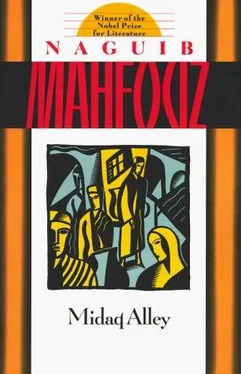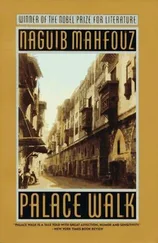Naguib Mahfouz - Midaq Alley
Здесь есть возможность читать онлайн «Naguib Mahfouz - Midaq Alley» весь текст электронной книги совершенно бесплатно (целиком полную версию без сокращений). В некоторых случаях можно слушать аудио, скачать через торрент в формате fb2 и присутствует краткое содержание. Жанр: Современная проза, на английском языке. Описание произведения, (предисловие) а так же отзывы посетителей доступны на портале библиотеки ЛибКат.
- Название:Midaq Alley
- Автор:
- Жанр:
- Год:неизвестен
- ISBN:нет данных
- Рейтинг книги:4 / 5. Голосов: 1
-
Избранное:Добавить в избранное
- Отзывы:
-
Ваша оценка:
- 80
- 1
- 2
- 3
- 4
- 5
Midaq Alley: краткое содержание, описание и аннотация
Предлагаем к чтению аннотацию, описание, краткое содержание или предисловие (зависит от того, что написал сам автор книги «Midaq Alley»). Если вы не нашли необходимую информацию о книге — напишите в комментариях, мы постараемся отыскать её.
Midaq Alley — читать онлайн бесплатно полную книгу (весь текст) целиком
Ниже представлен текст книги, разбитый по страницам. Система сохранения места последней прочитанной страницы, позволяет с удобством читать онлайн бесплатно книгу «Midaq Alley», без необходимости каждый раз заново искать на чём Вы остановились. Поставьте закладку, и сможете в любой момент перейти на страницу, на которой закончили чтение.
Интервал:
Закладка:
Salim Alwan— is the proprietor of a perfume company and a thriving business in black market goods. Salim Alwan has an insatiable sexual appetite that is nurtured by an exotic aphrodisiac that he consumes every day.
Saniyya Afify— is a wealthy and miserly widow who owns the second residence of the alley. She rents out the first floor to Dr. Booshy, and the second floor to Umm Hamida and Hamida. She is driven inexplicably to remarry and prefers young men. A woman nearly fifty years old, she is offered a thirty year old groom by Umm Hamida.
Sanker— is the waiter in Kirsha's cafe.
Sheikh Darwish— was once a teacher in religious foundation schools; the intrusion of governmental controls resulted in his demotion and his eventual psychological breakdown. Though he has no home and no familial connections, he is strangely at home everywhere. The residents of the alley regard him as a spiritual mystic.
Umm Hamida— earns her income as a bath attendant and as an arranger of marriages. She is Hamida's foster mother.
Uncle Kamil— good-hearted, bachelor, sweets-seller, is the best friend of Abbas, the barber; famously bloated and sleepy.
Zaita— is the "Cripple Maker" who makes a living by crippling healthy people so that they can beg. He collects a portion of their earnings. He is a hideous and repulsive character; he lives in squalor in the tiny room he rents from Husniyya and Jaada. He lusts after Husniyya.
About the Author
The leading Arabic novelist, Naguib Mahfouz was born in Cairo in 1911 and began writing when he was seventeen. A student of philosophy and an avid reader, he has been influenced by many Western writers, he says, including Flaubert, Zola, Camus, Dostoyevsky, and above all, Proust. Until his retirement in 1972, Mahfouz worked in various government ministries — but he was always writing. Today he has more than thirty novels to his credit, among them his masterwork _The Cairo Trilogy.__ He lives in the Cairo suburb of Agouza with his wife and two daughters.
[Mahfouz died in 2006.]
An Introduction to Midaq Alley
The novel and short story, not truly traditional forms of Arabic literary expression, have developed great popularity over the past century in most countries of the Middle East. Cairo, the cosmopolitan capital of the most populous country of the area, has throughout the period been its cultural and literary center. There, in 1911 in the Gamaliya section of the old city, Naguib Mahfouz was born. Despite his full-time career in responsible positions in various departments of the Egyptian civil service, he was to develop a dedication to literature that would later give him international prominence as his country's leading author. He has received honorary degrees from France, the Soviet Union, and Denmark and his works have been translated into many languages. In 1970 he received Egypt's prestigious National Prize for Letters and in 1972 he was awarded the Collar of the Republic, his nation's highest honor.
Mahfouz's parents were of the middle-class Muslim merchant class of Cairo and in his sixth year they moved away from the crowded and conservative ancient quarter where he was born to the modern European-style inner suburb of Abbasiya. Naguib grew up and went to school there and later attended Cairo University, where he obtained his bachelor's degree in philosophy in 1934. After graduation he joined the university's administration for a short period and then embarked on his long career with the Ministry of Waqf Pious Foundations and later other administrative branches of the Egyptian government.
He began writing even before completing his university education, publishing occasional short stories in literary journals. Though merely awkward little sketches of contemporary life and not popular today, they give the impression of a sober young man particularly sensitive to areas of conflict and tragedy in the lives of others; they are highly reminiscent of the works of Mustafa al-Manfaluti, to whose influence Mahfouz readily gives acknowledgment. It is clear that even then, unlike so many of his contemporaries who still despised prose fiction as a literary form, Mahfouz saw his stories as a means to bring enlightenment and reform to his society. The same sense of high morality and interest in the thoughts and motivations of others apparent in these early stories have marked all his later works as well, and contributed greatly to the broad range of respect he enjoys.
Also in the thirties he published a translation from English of a work dealing with life in ancient Egypt. This subject had then, after the sensational archaeological discoveries at Luxor and particularly the uncovering of the tomb of Tutankhamen, come to fascinate many of his countrymen. Following publication of a volume of further short stories set in modern Egypt, his attention again reverted to ancient times. In the middle and late thirties he wrote three novels depicting aspects of life in ancient Egypt that had obvious significance for his countrymen still living under forms of British control and a somewhat tyrannical King Farouk. Two of the novels deal with the struggle of the people of Egypt against despotic monarchs; the third shows how the Egyptians cast off the rule of the Hyksos invaders.
Mahfouz has said that his intention at that time was to write a lengthy series of historical novels set in ancient Egypt, but by the early forties his attention had in fact come to focus firmly once more on life in his contemporary society. A series of four novels of the period demonstrate the instability of family life in Cairo and the corruption pervasive in the governmental and party-political structure of the country. They stress in particular how dependent morality is on a secure material base and on simple good fortune. In these stories we see the Cairo of the Second World War, living under the pressures of the presence of a Britain at war and in the expectation of a Nazi invasion. The social consequences of the German air raids are a common theme of Egyptian literature of the time and in Mahfouz's novels too we see how barriers of class, age, and sex dissolve as people are forced to crowd together in the air-raid shelters. In his novels _Khan al-Khatili__ and _Zuqdq al-Midaq (Midaq Alley),__ both named after streets in the Azhar quarter of the ancient city, the author turned his attention away from the comparative sophistication of his middle-class and suburban characters to those of an area similar to that of his own birth. How he is charmed and intrigued by the richly colorful life of these people is apparent in all his major work for the next decade. Whatever his central themes, the novels crowd with minor characters depicted with keen perception and great humor.
During the late forties he busied himself with construction of his 1,500-page _Cairo Trilogy,__ each part named after a street near the great and revered mosque of Hussain in the same quarter of Cairo. Covering the fortunes of a large Muslim merchant family, perhaps like his own, over the first half of this century, it provides fascinating insight into the panorama of Egyptian life of the period. The cast of characters is rich and their interpersonal and societal relationships are examined in precise detail and authenticity. Time and change is a recurring theme of Mahfouz's work and in _The Cairo Trilogy__ he has ample room to develop it to the full. He shows how traditional Muslim views of, for example, the marriage relationship developed in the space of only fifty years from one of absolute subservience of the wife to one of near equality. The social and political conflicts of the turbulent period are seen to influence every aspect of Egyptian life, as controversies rage between individual members of the family over their allegiance to conflicting systems of belief and behavior. Support and opposition to the monarchy and the various political factions, the Muslim Brethren or the Marxists, and devotion or indifference to the constant struggle with the British, are seen as dominant and explosive issues.
Читать дальшеИнтервал:
Закладка:
Похожие книги на «Midaq Alley»
Представляем Вашему вниманию похожие книги на «Midaq Alley» списком для выбора. Мы отобрали схожую по названию и смыслу литературу в надежде предоставить читателям больше вариантов отыскать новые, интересные, ещё непрочитанные произведения.
Обсуждение, отзывы о книге «Midaq Alley» и просто собственные мнения читателей. Оставьте ваши комментарии, напишите, что Вы думаете о произведении, его смысле или главных героях. Укажите что конкретно понравилось, а что нет, и почему Вы так считаете.












